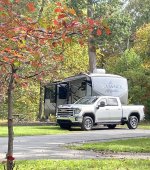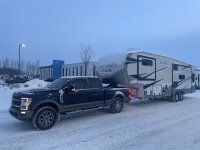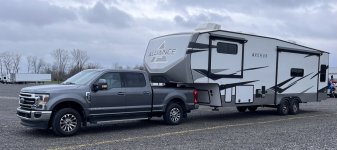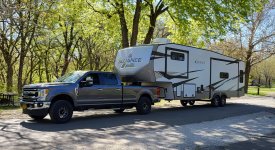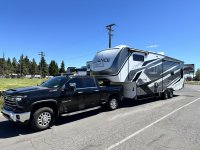You are using an out of date browser. It may not display this or other websites correctly.
You should upgrade or use an alternative browser.
You should upgrade or use an alternative browser.
Proper Truck to tow Alliance Avenue 32RLS
- Thread starter Sagi1971
- Start date
It can depend on a lot of factors, but at a minimum I'd say a 3/4 ton truck like an F250 or 2500. It's very dependent on weight, truck size, bed length, single rear wheel (SRW) or dual rear wheel (DRW), etc. I have a Paradigm 310RL and have a 2020 GMC 3500HD with DRW with the long bed and diesel engine. My weight capacities are higher for payloads compared to a 2500 SRW. My experience so far has been great. The truck has no issue with towing, it's nice and stable, etc.I am in the process of looking into purchasing an Alliance Avenue 32RLS. I am in the VERY early stage of looking into it.
What I am curious to find out is this.
What particular truck is best for towing it?
You could look at some YouTube videos on truck and trailer capacities. I know NRVTA, Big Truck Big RV, Keep Your Daydream, and many other channels have videos on this that I thought were very well put together and explained all that goes into "What truck is best". Irene Iron Travels is another who had a 3/4 ton truck with an Alliance Paradigm 310RL and found out they were overweight when they got on a scale. That's the big factor. Research the weight limits and payload capacities for each truck and the specific setups, because they can vary a lot, even with the same model depending on configurations.
Hopefully that's helpful info. Not a specific "get this truck" answer, but I don't think that's really out there unless you just want to get something that will automatically be overbuilt for that trailer, like an F450. Even then, if you load it with rocks, you might go overweight!
Turfengineer
Well-known member
Midnight Rider
Well-known member
Get as much truck as you can afford in my opinion.View attachment 2886I am in the process of looking into purchasing an Alliance Avenue 32RLS. I am in the VERY early stage of looking into it.
What I am curious to find out is this.
What particular truck is best for towing it?
Attachments
Last edited:
I'm a little late to the show but for the benefit of others...
I picked up a 2025 32RLS in Sept '24. The unit is stock and has no additional features such as double pane windows, etc., (except for two full propane tanks and a lead acid battery that the dealer added) that would add additional weight. I weighed in just before picking up the unit and immediately after and I was a bit surprised at the results. Advertised pin weight is 2,000 lbs, actual was 2,460. Advertised dry empty weight was 10,500 lbs, actual was 11,180.
That's 460 extra pounds of pin weight and 680 extra pounds dry weight. Pin weight is usually the limiting factor when choosing a truck capable of handling a 5th wheel so the 460 extra pounds on the pin may be a bit of a concern to some.
In my case, I have a '23 RAM 3500 diesel SRW. I can have 7000 lbs on the drive axle. With the 32RLS hitched up, I have 6220 lbs sitting on the drive axle. This only leaves 780 lbs. left on the drive axle before I'm overweight. Add fresh water, some solar equipment and all the other necessary gear (in the unit and truck) and I'll be getting close to the limit, if not exceeding it.
I don't know the carrying capacity of different trucks but I would venture to say that many 3/4 ton trucks, especially if it has a heavy diesel engine, will be cutting it close or possibly exceeding the recommended weight limits for that vehicle if pulling a 32RLS. I'd be interested in hearing from 3/4 ton truck owners who have weighed their trucks on where they stand, especially gas trucks since they will probably have a higher weight carrying capacity.
So I guess the takeaway of this is to choose your truck carefully and to take the advertised weights of your 5th wheel with a grain of salt.
I picked up a 2025 32RLS in Sept '24. The unit is stock and has no additional features such as double pane windows, etc., (except for two full propane tanks and a lead acid battery that the dealer added) that would add additional weight. I weighed in just before picking up the unit and immediately after and I was a bit surprised at the results. Advertised pin weight is 2,000 lbs, actual was 2,460. Advertised dry empty weight was 10,500 lbs, actual was 11,180.
That's 460 extra pounds of pin weight and 680 extra pounds dry weight. Pin weight is usually the limiting factor when choosing a truck capable of handling a 5th wheel so the 460 extra pounds on the pin may be a bit of a concern to some.
In my case, I have a '23 RAM 3500 diesel SRW. I can have 7000 lbs on the drive axle. With the 32RLS hitched up, I have 6220 lbs sitting on the drive axle. This only leaves 780 lbs. left on the drive axle before I'm overweight. Add fresh water, some solar equipment and all the other necessary gear (in the unit and truck) and I'll be getting close to the limit, if not exceeding it.
I don't know the carrying capacity of different trucks but I would venture to say that many 3/4 ton trucks, especially if it has a heavy diesel engine, will be cutting it close or possibly exceeding the recommended weight limits for that vehicle if pulling a 32RLS. I'd be interested in hearing from 3/4 ton truck owners who have weighed their trucks on where they stand, especially gas trucks since they will probably have a higher weight carrying capacity.
So I guess the takeaway of this is to choose your truck carefully and to take the advertised weights of your 5th wheel with a grain of salt.
Last edited:
This is why experienced RV'ers know to ignore dry weights. They are notoriously inaccurate and deceiving.
All calculations should be done using GVW or the RV. Pin weight estimated at 22% of GVW.
Now some argue GVW is overkill and they will never load RV to max. GVW.
If we assume that is true worst case is you end up with a bit too much truck.
Too much truck gives you a bit more margin above your parameters which is generally a good thing in terms of performance.
However if you use dry weight worst case is you end up with the wrong truck.
If you Exceed axle rating you have the wrong truck.
More capacity margin is a good thing, there is no need to cut it close.
Using GVW eliminates the surprises encountered when using dry weights.
All calculations should be done using GVW or the RV. Pin weight estimated at 22% of GVW.
Now some argue GVW is overkill and they will never load RV to max. GVW.
If we assume that is true worst case is you end up with a bit too much truck.
Too much truck gives you a bit more margin above your parameters which is generally a good thing in terms of performance.
However if you use dry weight worst case is you end up with the wrong truck.
If you Exceed axle rating you have the wrong truck.
More capacity margin is a good thing, there is no need to cut it close.
Using GVW eliminates the surprises encountered when using dry weights.
Last edited:
Using the 22% rule seems to be a good rule of thumb.All calculations should be done using GVW or the RV. Pin weight estimated at 22% of GVW.
If you Exceed axle rating yu have the wrong truck.
Exceeding the axle rating on any truck is definitely a bad idea when towing an RV since we're usually traveling a long distance. The wear and tear may show itself in a most unpleasant, expensive and possibly dangerous way. To me, it's not worth the risk.


